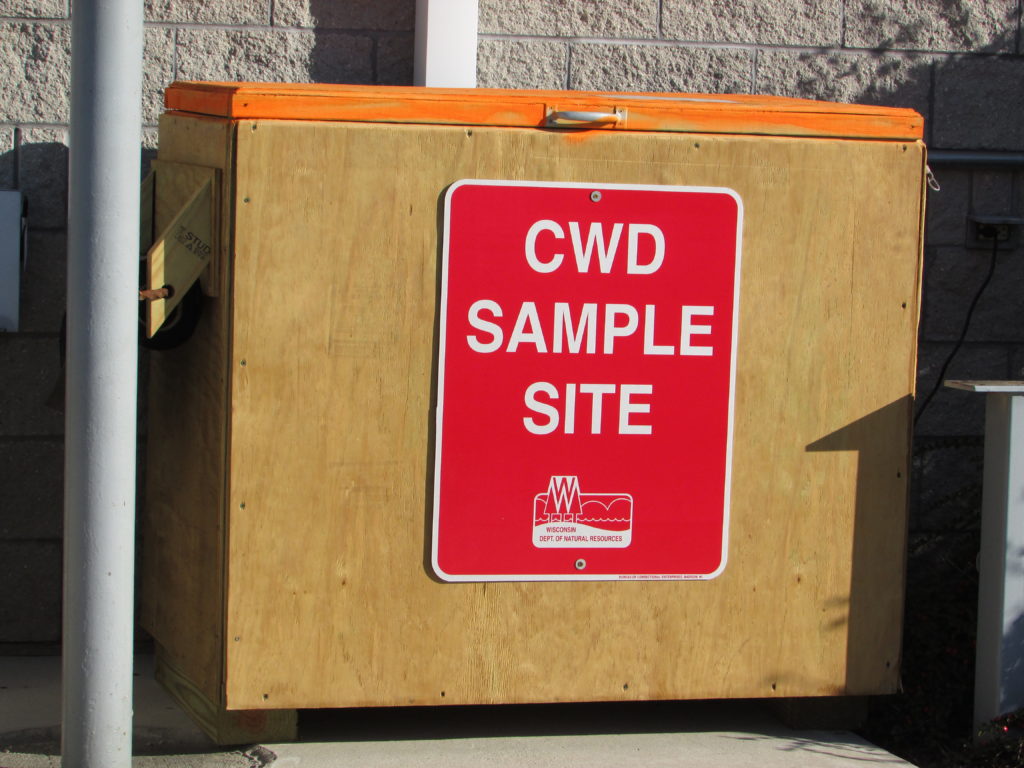Help Slow The Spread Of CWD This Season By Adopting A Kiosk Or Dumpster
The Adopt-a-Kiosk program provides hunters with easy access to CWD sampling materials. / Photo Credit: Wisconsin DNR
You can make a difference this year and help the Wisconsin Department of Natural Resources (DNR) slow the spread of Chronic Wasting Disease (CWD) in Wisconsin by participating in the Adopt-a-Kiosk or Adopt-a-Dumpster programs.
The Adopt-a-Kiosk program provides hunters with easy access to CWD sampling materials. Hunters can submit these samples for CWD testing to help the DNR monitor the disease’s spread and learn the status of their deer.
The Adopt-a-Dumpster program gives hunters more options to safely dispose of deer carcasses and waste, keeping potentially infected deer off the landscape.
Visit our CWD Volunteer webpage to learn how you can participate in these opportunities and make a difference this season.
Hunting Plays A Critical Role In Deer Management Efforts
Deer hunting is about more than just making memories or filling a freezer. It plays a pivotal role in managing Wisconsin’s deer herd.
Hunting is a form of predation. It helps maintain deer populations and reduce the negative impacts of deer, such as crop damage, decreased forest regeneration and car accidents.
In addition, the timing of the deer hunting season is important as well. Reducing the population prior to the frigid winter temperatures means scarce food sources go further, allowing surviving deer less competition to stay healthy and strong into the spring.
Photo Credit: iStock.com/Michael-Tatman
|
Discover Public Land To Hunt This Season Using The DNR’s Online Mapping Tools
The Wisconsin Department of Natural Resources (DNR) encourages the public to explore and hunt on public land this hunting season. Wisconsin is home to millions of acres of public land, and the majority is open to hunting.
Hunters can start their quest for new public hunting areas from the comfort of home using the DNR’s online public lands mapping tools. These tools provide information on state-owned properties, voluntary public access lands and more:
Once hunters have done their preliminary research online, the next step is to scout the habitat and search for wildlife sign. The DNR recommends hunters scout multiple options in case of changing weather conditions or added hunter pressure in an area.
As hunters head out to explore their public land, hunters are reminded that public lands are for everyone, and it is possible that other hunters and recreational users could be on the property. Follow these tips to ensure a safe and successful experience in Wisconsin’s wild spaces:
- Know the property boundaries and only hunt in legal areas.
- Follow leave no trace principles; this includes altering or cutting tree limbs.
- Be adaptable and have a backup plan.
- Be aware and respectful of other hunters, recreators and DNR staff.
- Follow the TAB-K rules of firearm safety to protect yourself and others:
T – Treat every firearm as if it is loaded.
A – Always point the muzzle in a safe direction.
B – Be certain of your target, what’s before it and what’s beyond it.
K – Keep your finger outside the trigger guard until you are ready to shoot.
For more information on regulations, season dates, hunting hours and other helpful resources, visit the DNR’s Hunter Resources webpage.
Photo Credit: Eugene Hester/USFWS
|
Due To Drought Conditions, Mussels Are Getting Stranded By Low Water
Low waters have left some of our native mussels, also known as clams, trapped and exposed on riverbeds.
Fortunately, they can be rescued. If you see mussels out of the water, you can simply pick them up and throw them into deeper water. If they are gaping open and proceed to close when picked up, they can still be saved, but if they are gaping open and don’t respond when picked up, they are already dead.
The mussels can be returned to the water individually or gathered in buckets or bags and released into deeper water together. When returning mussels to the water, time is of the essence, and it is important they be put in areas that are deep enough to ensure they won’t be stranded again.
Our native mussels are an important part of our aquatic ecosystems, and any effort to save them during this drought will benefit our rivers now and and in the future. Each mussel filters gallons of water each day, and the more mussels saved, the more filtering capacity that will be preserved.
Photo Credit: Timm Zumm
|
|
